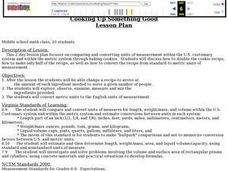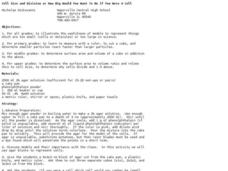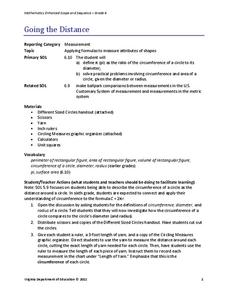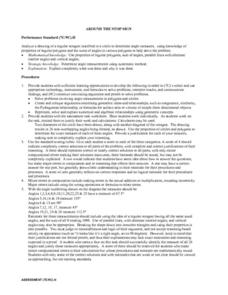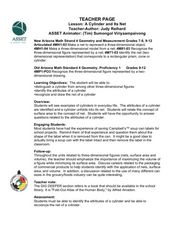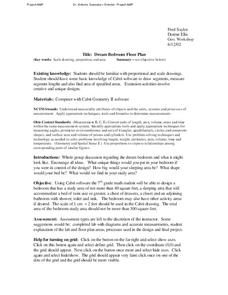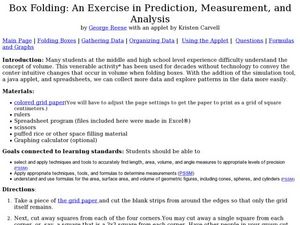Mathematics Assessment Project
Sampling and Estimating: Counting Trees
Your task today: count all the trees on a tree farm. To complete the assignment, learners first estimate the number of trees on a tree farm using random sampling. To improve their own response they then evaluate provided responses to the...
Mathematics Assessment Project
Applying Angle Theorems
Polygon ... an empty bird cage? After finding the angles of a polygon, young mathematicians use the provided methods to solve the problem in multiple ways.
Curated OER
Hierarchy Theory and Biotic Hierarchy
Learners examine the hierarchy theory and biotic organization by playing a teacher-created card game matching groups of items, such as organelles, in suits of four. They discuss the reasons for their hierarchical organization of the...
Curated OER
Describe Environmental Interrelationships
Students describe environmental interrelationships using list of criteria. They are able to explain organism interaction, based on definitions provided. Also, students can use references and worksheets, to describe effects of pollution...
Pennsylvania Department of Education
A Geometric Scavenger Hunt
Fifth graders connect their knowledge of polygons and polyhedrons. For this geometric shapes lesson, 5th graders identify and classify two- and three-dimensional objects. Students construct a polyhedron out of polygons and describe their...
Curated OER
Cooking Up Something Good
Students compare and convert units of measurement within the United States customary system and within the metric system by baking cookies. Students discuss how to double the cookie recipe, how to make only half of the recipe, and how to...
Curated OER
Cell Size and Division or How Big Would You Want To Be if You Were a Cell?
Students investigate why cells divide. In this cell size lesson plan, students observe how far a solution travels into 3 different size model cells of agar. They answer questions about the most effect movement of "nutrients" into the...
Curated OER
Ratios of Similar Figures
Students identify the ratios of different triangles. In this geometry lesson, students identify the similarity and differences of triangles. They use the navigator to move the sides of the triangle around.
LABScI
Freezing Point Depression: Why Don’t Oceans Freeze?
Can you go ice fishing in the ocean? Learners examine the freezing point of different saltwater solutions. Each solution has a different concentration of salt. By comparing the freezing points graphically, they make conclusions about...
Virginia Department of Education
Going the Distance
Estimate the value of one of the most famous irrational numbers. The hands-on lesson plan instructs classmates to measure the circumference and diameters of circles using yarn. The ratio of these quantities defines pi.
Teach Engineering
The Amazing Aerogel
Introducing ... the aerogel. The first of a two-installment series teaches young engineers about the properties and uses of aerogels. A PowerPoint presentation provides information about this unique material to help solidify the concept.
Curated OER
Around The Stop Sign
Young scholars analyze a drawing of a regular octagon inscribed in a circle to determine angle measures, using knowledge of properties of regular polygons and the sums of angles in various polygons to help solve the problem. They use...
Virginia Department of Education
Exponents and Radicals
What is that fraction doing as an exponent? Fun math games prompt learners to practice evaluating radical expressions and expressions containing rational exponents, both in groups and individually.
Curated OER
Using Concept Maps to Design 3D Spheres
High schoolers create three dimensional shapes using concept maps. In this geometry lesson, students investigate the impact of mental schemas on humans. They collect data on this topic and plot their data on a coordinate plane.
Curated OER
A Cylinder and Its Net
Young scholars sketch the nets for given polygons and cylinders. In this geometry lesson, students find the measurements that correspond with prisms, cones and cylinders. they identify parts of three-dimensional shapes.
Curated OER
Camping with a Triangular Prism and Its Net
Learners differentiate triangular prisms from other prisms using nets. In this geometry lesson, students define the properties of a triangular prism and its symmetry. They build a triangular prism moving lines around.
Curated OER
Pyramids on Parade/Nets
Students sketch the shape of three dimensional pyramids using nets. In this geometry lesson, students differentiate a pyramid from other three dimensional shape. They define the attributes of pyramids.
Curated OER
Dream Bedroom Floor Plan
Students build and apply concepts of geometry. In this geometry lesson, students create a building using proportions and scale drawings. They use Cabri technology to create a virtual drawing first.
Curated OER
Dream Bedroom Floor Plan
Students construct using Cabri software. In this geometry lesson, students convert between units and apply the correct measurements to build objects. They create the room virtually and manipulate the shapes to the desired measurements.
Curated OER
Get the Turtle to the Pond
Young scholars solve problems. In this math activity, students write solutions using LOGO commands in order to help get the turtle to the pond.
Curated OER
Box Folding: Predict, Analyze and Measure
Young scholars predict the shape of a geometric figure in 3D. In this geometry lesson, students construct 3D shapes to perfect their knowledge of measuring and predicting. This assignment is also available as an online interactive lesson.
Curated OER
The Circle's Measure
Students explore circumference and diameter. For this math lesson, students apply their knowledge of circumference and diameter to solve mathematical riddles. Students apply this knowledge to find circumference and diameter of various...
Curated OER
Getting Familiar with Fractals
Young scholars use the Internet to answer lab questions about fractals, and then construct fractals using the initial stage and iteration rule. They complete tables and generate rules for the "nth" term and create their own fractals.
Curated OER
Populations Lab - Exponential Graphing
Ninth graders investigate the application of populations that exists in one's everyday environment, in order to develop an understanding of how mathematics is a key component in the understanding of population dynamics.
Other popular searches
- Volume and Surface Area
- Volume Surface Area
- Surface Area Volume Cylinder
- Surface Area to Volume Ratio
- Surface Area Volume Project
- Change Surface Area Volume
- Sphere Volume Surface Area
- Area Volume Surface Area
- Geometry Surface Area Volume
- Cells Surface Area Volume
- Volume Surface Area Prism
- Cell Surface Area and Volume







